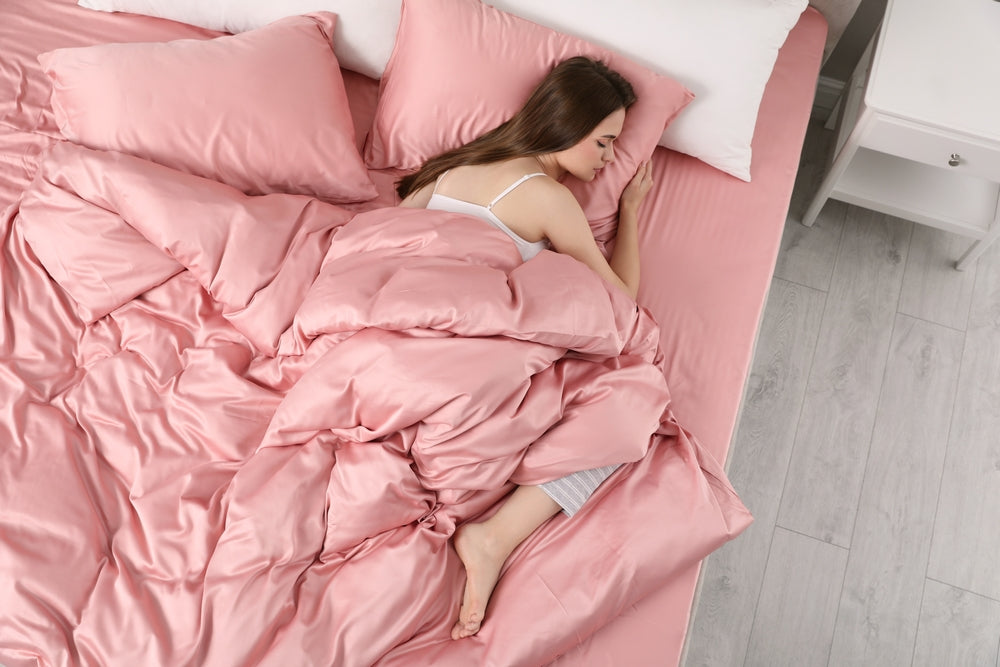Free U.S. Shipping On Orders Over $150

Shopping for Bed Sheets? Avoid These 5 Types
Posted on
There’s no shortage of advice all over the internet on the best bed sheets to buy. Not so much on which kinds of sheets you should stay away from. So that’s what we are going to discuss today.
Note that not all these bed sheets are universally bad for everyone. They are just not ideal for some sleepers. Let’s get started.
What to Avoid When Buying Bed Sheets
- Sheets with poor breathability — These types of bed sheets trap body heat, making you uncomfortably hot especially in the spring and summer. They can also worsen hot flashes and night sweats.
- Sheets that don't wick sweat — Instead of absorbing sweat, they trap it on your skin, making you feel clammy and hot. Usually, sheets with poor breathability are also bad at absorbing sweat, so they feel twice as awful. These types of sheets are also bad for your skin. They can cause or worsen acne and other skin problems. They also make your bed stink.
- Sheets that take forever to dry — Some sheets absorb sweat, but then hold on to it. If you sweat a lot, you’ll wake up in the middle of the night thinking you’ve wet the bed because of how damp the sheets are.
- Sheets that feel rough on the skin — Seriously, soft sheets are not a luxury. They are a necessity for good quality sleep, particularly if you have sensitive skin or skin issues like eczema and psoriasis.
- Sheets that don't last long — Instead of going back to the store for new sheets every year, you are better off spending more on higher quality sheets that will last a few years.
The 5 Types of Bed Sheets to Avoid
1. Satin ‘Silk’ Bed Sheets
If you come across ‘silk’ sheets that are suspiciously cheap, that’s not real silk. They are most likely satin sheets. But sellers will often label them as silk or silky sheets.
In reality, they are the furthest thing you can get compared to actual silk sheets. They have a slippery texture that many people don't like. Worst of all, they don't breathe or wick moisture.
So if you sleep hot or sweat at night, satin sheets trap the heat, making you even hotter. They also trap sweat on your skin, leaving you damp and clammy. Some people describe satin sheets as similar to sleeping on a plastic bag.
Just don't get them. They are cheap but not worth it.
2. Low Quality Polyester/Microfiber Bed Sheets
Most people opt for polyester or microfiber sheets because they are affordable, feel fairly soft and they are easy to take care of.
The problem with polyester sheets is that they have poor breathability. So they make you hot and sweaty. Similar to satin, polyester also traps sweat instead of wicking it away.
There are some high quality poly bed sheets that are more comfortable. These are usually blends. Polyester is mixed with cotton, bamboo or Tencel to make it more breathable and moisture-wicking. These are good if you are on a budget.
3. Low Thread Count Cotton Sheets
Everyone preaches the gospel of cotton sheets. They are soft, breathable, moisture-wicking and so on. What many people don't tell you is that there are some absolutely awful cotton sheets.
If you go for the cheapest set of cotton sheets you find in a store, you’ll get what you pay for.
The first thing you want to check is the type of cotton used. Only buy long or extra long staple cotton sheets like Egyptian or Supima cotton. These are soft and smooth.
Next, check the thread count. Avoid anything with a thread count of under 200. It will be lightweight and breathable, but it will feel rough against your skin. It will also be thin and likely to wear out quickly.
4. Very High Thread Count Cotton Sheets
Some people become obsessed with thread count and get lured by 1000 thread count cotton sheets. While anything under 200 is bad, a too-high thread count is also not ideal.
Anything over 500-600 thread count is likely a lie (marketers use counting tricks to inflate numbers) or it will be too heavy and hot.
For percale cotton sheets, don't go above a 300 thread count. This ensures the sheets stay cool and breathable. Sateen cotton sheets usually have a higher thread count, which is why they are softer. But anything over 600 will be too dense to be comfortable.
5. Sateen Cotton Sheets — If You Are a Hot Sleeper
The percale and sateen sheets we’ve mentioned above refer to the types of weaves used to make cotton sheets. Percale sheets are crisp and sleep cooler, while sateen sheets are softer and denser.
If you are a hot sleeper or you are buying summer sheets, avoid cotton sateen sheets. They trap more heat and can get too warm. If you sweat a lot, sateen sheets will absorb moisture but dry too slowly, so you end up with damp sheets.
We recommend percale cotton sheets. But if you only get mildly hot at night, you can take a risk with lower thread count (about 300) sateen sheets if you want their soft texture.
So, Which Bed Sheets Should You Get?
For most people, high quality 100% cotton sheets are fine. If you are on a budget, poly-cotton or poly-bamboo offer good comfort at a lower price.
If you want the softest, coolest, most absorbent and fastest drying sheets, there are two types I highly recommend: linen sheets and Mulberry silk sheets.
These natural sheets cost more, but they are worth it. And with good care, they easily outlast other types of bed sheets.
Quick links
Contact
6063 Hudson Road #160
Woodbury, MN 55125
Yo@hercLeon.com
Leave a comment: